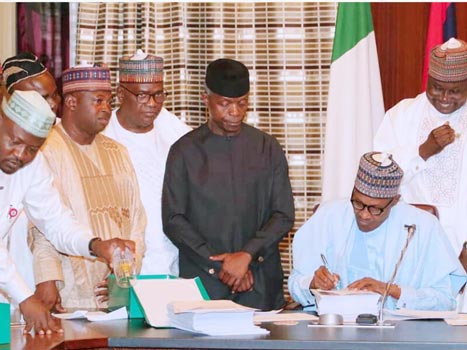
Amid lamentations and outright displeasure, President Muhammadu Buhari on Wednesday in Abuja signed the 2018 Appropriation Bill into law months after it was presented to the National Assembly.
Buhari lamented the failure of the National Assembly to pass the budget before the end of last year in accordance with the executive plan to return the country to January-December budget cycle.
He noted that the development had a very significant accelerator effect on the financial plans of other tiers of government, and even more importantly, the private sector, which mostly operates on a January-December financial year.
He however said notwithstanding the setback, he remained committed to the course of improving Nigeria’s budgeting process and sustaining the vision to return the country to January-December budget cycle.
While lamenting that the National Assembly made budget cuts to the tune of ₦347 billion for critical 4,700 projects from the original proposal and introduced fresh 6,403 projects at the cost of ₦578 billion into the budget, Buhari stressed that the budget would be difficult to implement.
According to the president, such budget cuts and fresh additions would hamper the government’s plan to deploy the 2018 budget for the consolidation of the achievements of previous budgets as well as simultaneously delivering on Nigeria’s Economic Recovery and Growth Plan (ERGP) 2017-2020.
He further stressed that the projects introduced by the lawmakers into the budget had no cost placed on them neither were they conceptualized and designed hitherto, pointing out that the new projects were added to the budgets of ministries, departments and agencies (MDAs) without bearing in mind their capacity to implement them.
“The provisions for some nationally/regionally strategic infrastructure projects such as counter-part funding for the Mambilla Power Plant, Second Niger Bridge/ancillary roads, the East-West Road, Bonny-Bodo Road, Lagos-Ibadan Expressway and Itakpe-Ajaokuta Rail Project were cut by an aggregate of ₦11.5 billion.
“Similarly, provisions for some ongoing critical infrastructure projects in the FCT, Abuja especially major arterial roads and the mass transit rail project, were cut by a total of N7.5 billion. The provision for Rehabilitation and Additional Security Measures for the United Nations Building by the FCT, Abuja was cut by N3.9 billion from N4 billion to 100 million; this will make it impossible for the Federal Government of Nigeria to fulfill its commitment to the United Nations on this project,” Buhari said.
He added: “However, it is my intention to seek to remedy some of the most critical of these issues through a supplementary and/or amendment budget which I hope the National Assembly will be able to expeditiously consider,” the president added.
He said he was, however, glad that ₦1.5 trillion was spent on capital projects in the 2017 fiscal year, adding that the administration would work hard to generate the revenues required to finance projects and programmes contained in the 2018 budget.
He also said a deficit budget, which he described as the borrowing plan of the government would be forwarded to the National Assembly very soon and urged the National Assembly to give the document a speedy consideration and approval.
President Buhari had presented a budget of ₦8.6 trillion estimated on $45 per barrel of oil bench mark price to the National Assembly in November last year, but the federal legislators increased the figures to ₦9.1 trillion having revised the oil price benchmark upwards to $51.
The budget signing ceremony was witnessed by Vice-President Yemi Osinbajo; Secretary to the Government of the Federation (SGF), Boss Mustapha; Chief of Staff, Abba Kyari, ministers as well as National Assembly members.
Senate President Bukola Saraki and Speaker of the House of Representatives, Yakubu Dogara were however represented by the Deputy Senate Leader, Bala Na’Allah and House Chief Whip, Ado Doguwa respectively.

Turmoil In Edo Assembly As Speaker Suspends Three Lawmakers Over Impeachment Plot
Ikeja Electricity Distribution Company Slashes Tariffs For Band A Customers
Notorious Kidnappers Behind Greenfield University Attack Arrested In Kaduna
Police Quell Clashes In Ile-Epo, Arrest Over 50 Suspects And Uncover Drug Den